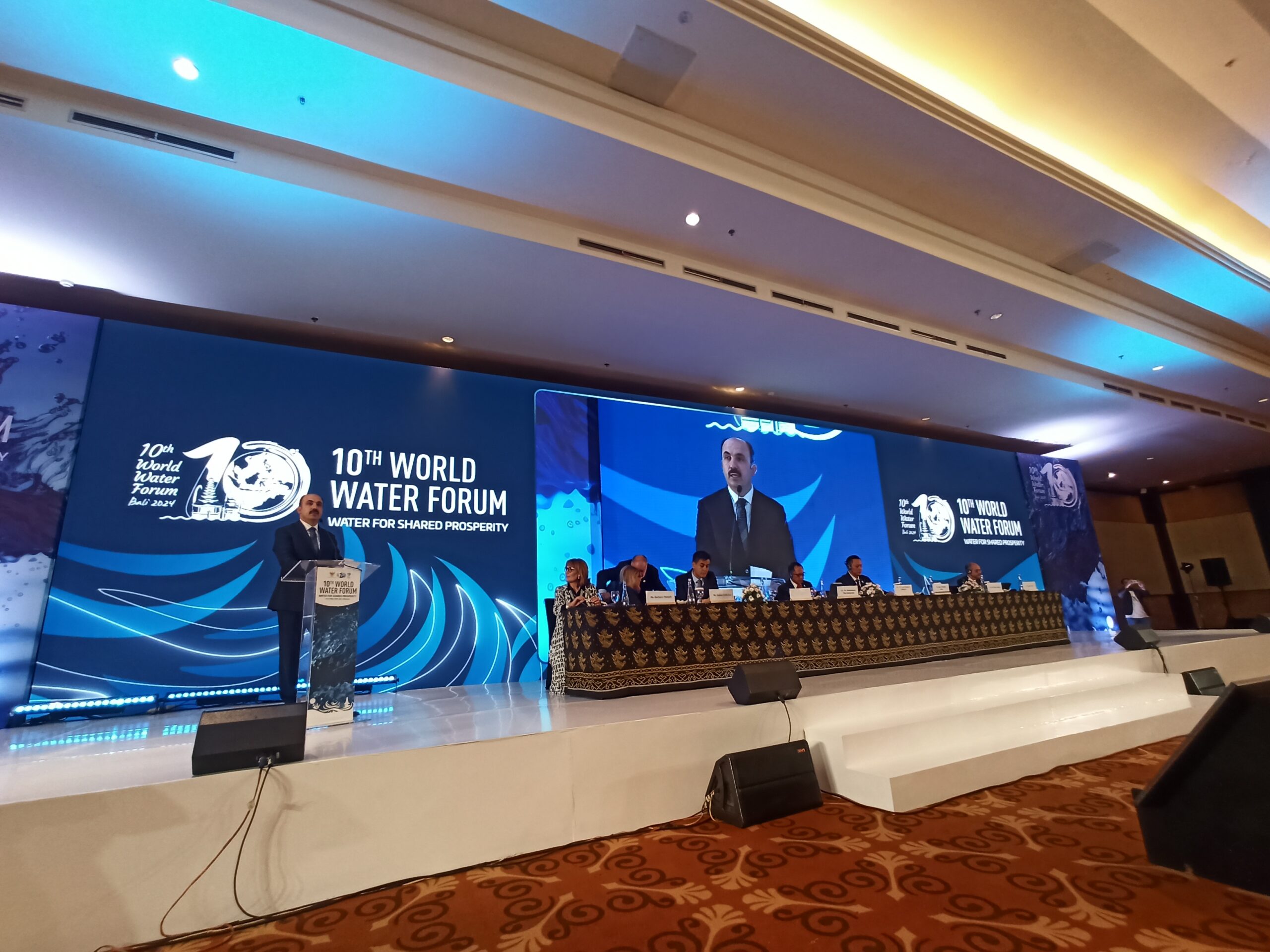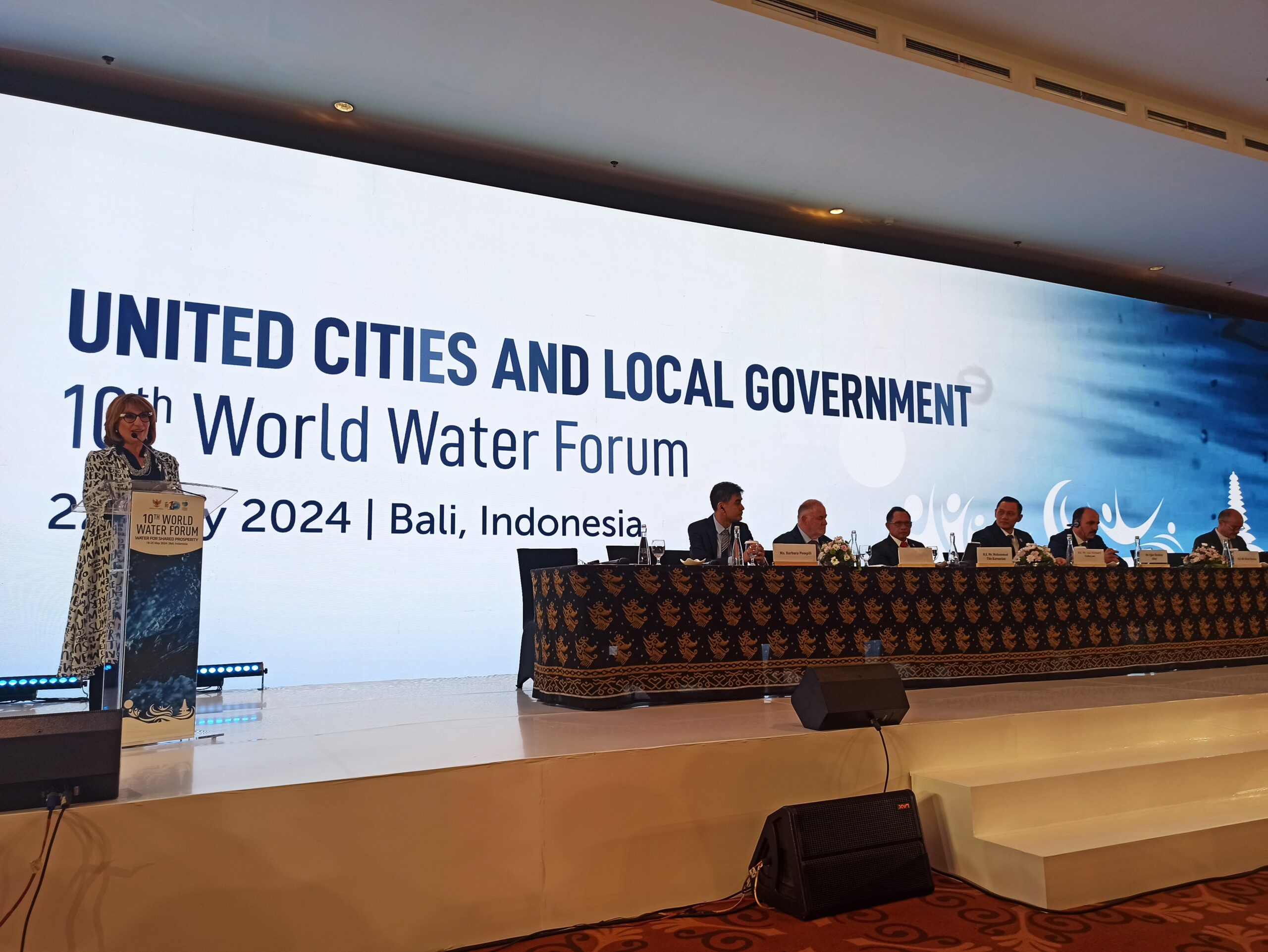Local and regional governance key to achieve universal human right to water and access to water and sanitation
23.05.2024

The 10th World Water Forum, co-organized by the World Water Council and the Indonesian government, took place in Bali from May 18 to May 25. It served as the largest multi-stakeholder event of its kind, bringing together a diverse array of stakeholders, from national governments to civil society, academia, and local and regional authorities. UCLG’s consistent engagement in every edition of the Forum since 2006 underscores our unwavering commitment to advancing water governance.
Following the signing of a strategic partnership between UCLG and the World Water Council, UCLG has been actively involved throughout the World Water Forum in promoting the role of territories in safeguarding water as a common good and universal public service. The highlight of our mobilization occurred on May 22 with the organization of the Local and Regional Government Day and other events, emphasizing our commitment to amplifying local voices.
Local and Regional Government Day
The political process of local and regional governments at the 10th World Water Forum was officially opened on May 22nd in Denpasar, Indonesia, with a record attendance of 300 delegates, including 160 local and regional elected officials from across the globe — Asia-Pacific, Europe, Latin America, Africa, and the Middle East.
Led by the President of UCLG and Mayor of Konya, Mr. Uğur İbrahim Altay, the UCLG spokesperson on water and sanitation, Mr. André Viola, UCLG delegation involved representation from UCLG Regional Sections, with a significant mobilization From Asia Pacific with delegates from local and regional governments of Japan, Chile, the Philippines, Turkey, Indonesia, Portugal, Ecuador, Nepal, Senegal, Morocco, Cambodia, Bangladesh, China, and South Korea. Additionally, it included representatives from national governments, UN agencies (FAO and UNCDR), basin organizations, and our main partner, the World Water Council.
The Political Process of Local and Regional Governments focused on water protection and universal public services, aligning with current United Nations initiatives such as the UN Water Action Agenda, UN Oceans Conference, SDG6 acceleration, Dushanbe Water Action Decade process, One Water Summit in New York, COP15 of the United Nations Convention to Combat Desertification (UNCCD), and the UN Ocean Decade Conference in Barcelona. UCLG also endorsed the idea of a world Lake days as proposed by the ministerial declaration.
These global events underscored the urgency of addressing the water crisis amidst escalating climate change effects and aims to inform strategies for the upcoming UN Summit for the Future.
A Joint Declaration to shape Discussions at 10th World Water Forum
The opening day of the Local and Regional Governments segment at the 10th World Water Forum was marked by the adoption of a Joint Declaration, the culmination of extensive consultation facilitated by the UCLG World Secretariat in collaboration with its sections and partners. This Declaration was endorsed by the Government of Indonesia, the World Water Forum, and United Cities and Local Governments, and it played a central role in guiding discussions throughout the day. It facilitated a political dialogue among representatives of local and regional authorities and other political stakeholders present at the Forum, aligning the political agenda with the solutions and challenges faced by local authorities, especially in the context of upcoming global agendas such as the One Water Summit. The political recommendations from this Declaration will be presented at the Closing Ceremony of the World Water Forum on 25 May, aiming to influence the upcoming UN Summit for the Future and prepare the groundwork for the 11th World Water Forum in 2027 in Riyadh.
Mr. Uğur İbrahim Altay, Mayor of Konya and President of UCLG, reaffirmed the need to consider water as our global common good and need to emphasize its continued recognition as a public service.For all this to happen, local governments need to have resources and implementation mechanisms for effective implementation. These important steps will shed light on our strategy for the UN Summit for the Future and the next UN Water Conference.
Mr. Loïc Fauchon, President of the World Water Council, underlined that erratic climate evolution is affecting local communities and authorities, and we are gathered to restore the right balance between water for nature and water for humankind: local governments are key actors to control the use of the water, but they need to have the finance and capacities. The right of water needs to be recognised as such at all levels.
Ms. Barbara Pompili, Special Envoy of the President of the French Republic on the One Water Summit and Chair of OECD Water Governance Initiative, underlined that capacity is the key for local and regional governments, including human and financial resources.

Governance and financing strategies key for success
Throughout the Local and Regional Government Forum at the 10th World Water Forum, discussions consistently reinforced the primary commitments outlined in the Joint Declaration. Emphasizing the importance of water as a global common good and human right, the Declaration affirms inclusive governance and community involvement in decision-making processes. It advocates for strengthened multi-level governance and policy engagement across all government levels. Financially, there’s a push for innovative mechanisms to mobilize funding for inclusive water infrastructure, particularly in marginalized communities and for youth. The Declaration underscores the urgency of enacting legislative frameworks for safe drinking water and sanitation, alongside fair resource distribution. It also highlights the crucial role of women in water governance and the need for diverse voices in shaping water policies.
Furthermore, discussions stressed the role of water in conflicts and called for international solidarity and accountability in water-related issues. Promoting dialogue and cooperation through basin organizations and city diplomacy is also a key focus, alongside sustainable management plans and ecosystem protection initiatives.
André Viola, UCLG spokesperson on water and sanitation, affirmed the pivotal role of local and regional governments, stating, ‘We play a crucial role in achieving universal access to water as leading actors at the local level responsible for the planning, implementation, and management of water and sanitation services and need to be recognized as such”.
Main Expectations and Regional Insights on Water Governance at the World Water Forum
Among the highlights of the Local and Regional Government Day, it was essential to dedicate a segment to the main expectations regarding the 10th World Water Forum from members and sections of UCLG.
During the World Water Forum, UCLG presented the outcomes of regional consultations conducted with all UCLG regional sections at the “Returns on Regional Consultations” session during the LRG Forum. These consultations were based on a statement circulated among our members to inform the debates and UCLG’s long-term strategy on water issues. Highlighting UCLG’s participation in the forum, the session featured insights from key regions: Europe by Mr. André Viola, the Mediterranean by Mr. Oriol Illa Garcia, South America by Mr. Sergio Arredondo, and Africa by Mr. Jean-Pierre Elong Mbassi, Secretary General of UCLG Africa and Mr. Mohamed Sefiani, Mayor of Chefchaouen.
Special focus was given to Asia, moderated by Dr. Bernadia Irawati Tjandradewi, Secretary General of UCLG ASPAC, with detailed discussions by seven elected officials. The key message from ASPAC emphasized that water security can be achieved by promoting transboundary governance and management and by linking water security with economic benefits, livelihood accommodations, and integrating local planning documents into national strategies.
This session underscored the importance of considering regional specificities and the perspectives of local and regional governments in shaping global water policies and strategies.
Multi-Stakeholder Political Dialogue on Water
This final segment, titled “Multi-Stakeholder Political Dialogue on Water: Forging Sustainable Solutions for Global Agendas,” was organized by UCLG to facilitate a political dialogue among representatives of local and regional authorities and other political stakeholders present at the 10th World Water Forum. The objective was to align the political agenda with the solutions and challenges faced by local authorities in preparation for global agendas, including the One Water Summit. Facilitated by Ms. Emilia Saiz, Secretary General of UCLG, the session included participation from various stakeholders, including youth parliamentarians, basin organization representatives, government officials, and parliamentary representatives. The dialogue highlighted UCLG’s commitment to fostering multi-stakeholder dialogue to advance global water governance and strengthen the political dimension of water issues.
2nd Steering committee of the One Water Summit
UCLG participated in the 2nd Steering Committee for the preparation of the One Water Summit on May 21st, as part of the World Water Forum. For UCLG, this was a highlight of our participation in the forum. During this committee, we emphasized the importance of local authorities’ participation in organizing this event. The summit aims to establish innovative and transformative commitments with all involved actors, serving as milestones towards the United Nations Water Conference in 2026. The showcased solutions will focus on strengthening transboundary water cooperation, preserving freshwater ecosystems and biodiversity, proposing technical solutions for water management, reducing the water footprint in global value chains, and exploring opportunities to bridge the global financing gap in the water sector. These efforts aim to ensure the human right to water and sanitation while preserving our environment. Among the key elements we will highlight, we will particularly emphasize the importance of decentralized cooperation, which effectively addresses these ambitious objectives.
Asia-Pacific Focus: Building Smart and Resilient Cities at 10th World Water Forum
During the Forum, a special event organized by UCLG-ASPAC took place from May 21-23, focusing on building smart and resilient cities and communities and the role of policymakers and planners from local governments. This event, held on the Forum’s premises, emphasized integrated urban development in the context of water security, disaster risk reduction management, sustainable sanitation and water finance, and the localization of SDG 6.
Supported by the United Nations Centre for Regional Development (UNCRD), the Ministry of Land, Infrastructure, Transport, and Tourism (MLIT), and the Government of Japan, this event was the result of a series of capacity-building workshops on smart cities aimed at assisting developing countries in Asia and the Pacific.
With over 50 participants, including governors, mayors, policymakers, planners, and officials from local and regional governments across Asia and the Pacific, the main objective of the International Workshop on Smart and Resilient Cities was to provide technical assistance and support to urban policymakers, planners, and city officials. The focus was particularly on developing countries, including the least developed countries (LDCs), landlocked countries, and small island developing states (SIDS), to enhance their capacity to better address SDG 11 (Make Cities and Human Settlements Inclusive, Safe, Resilient, and Sustainable) through smart city solutions and measures. The workshop emphasized showcasing exemplary practices and case studies, especially related to the implementation of smart water management and disaster risk reduction technologies and solutions.